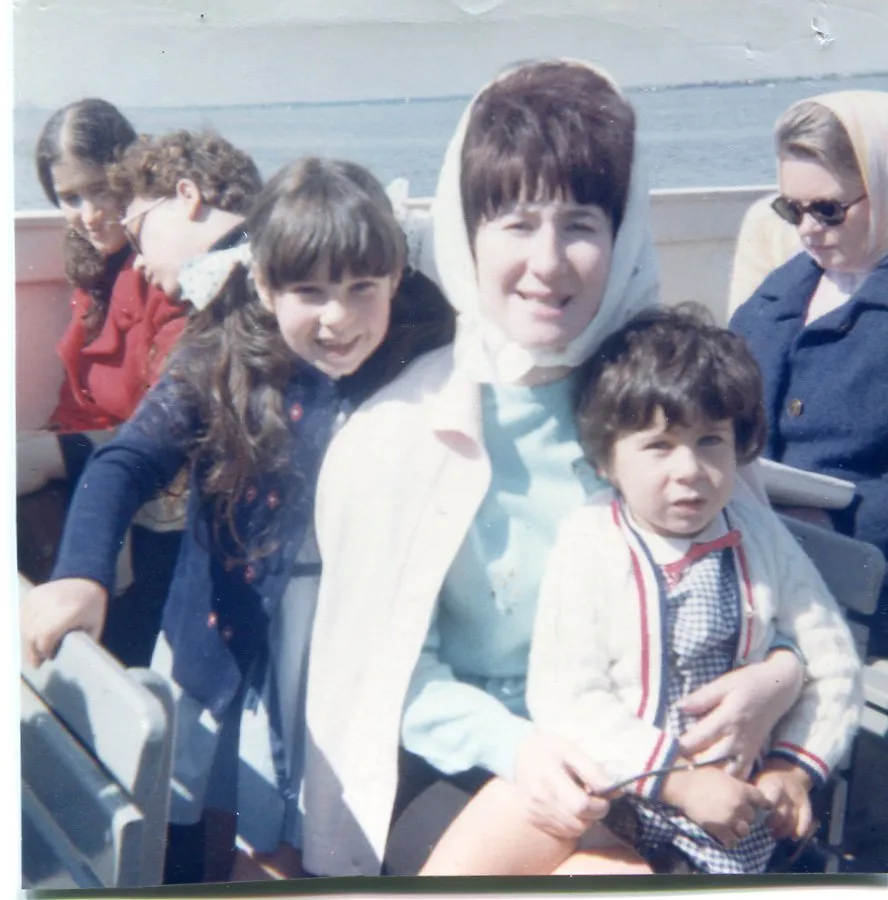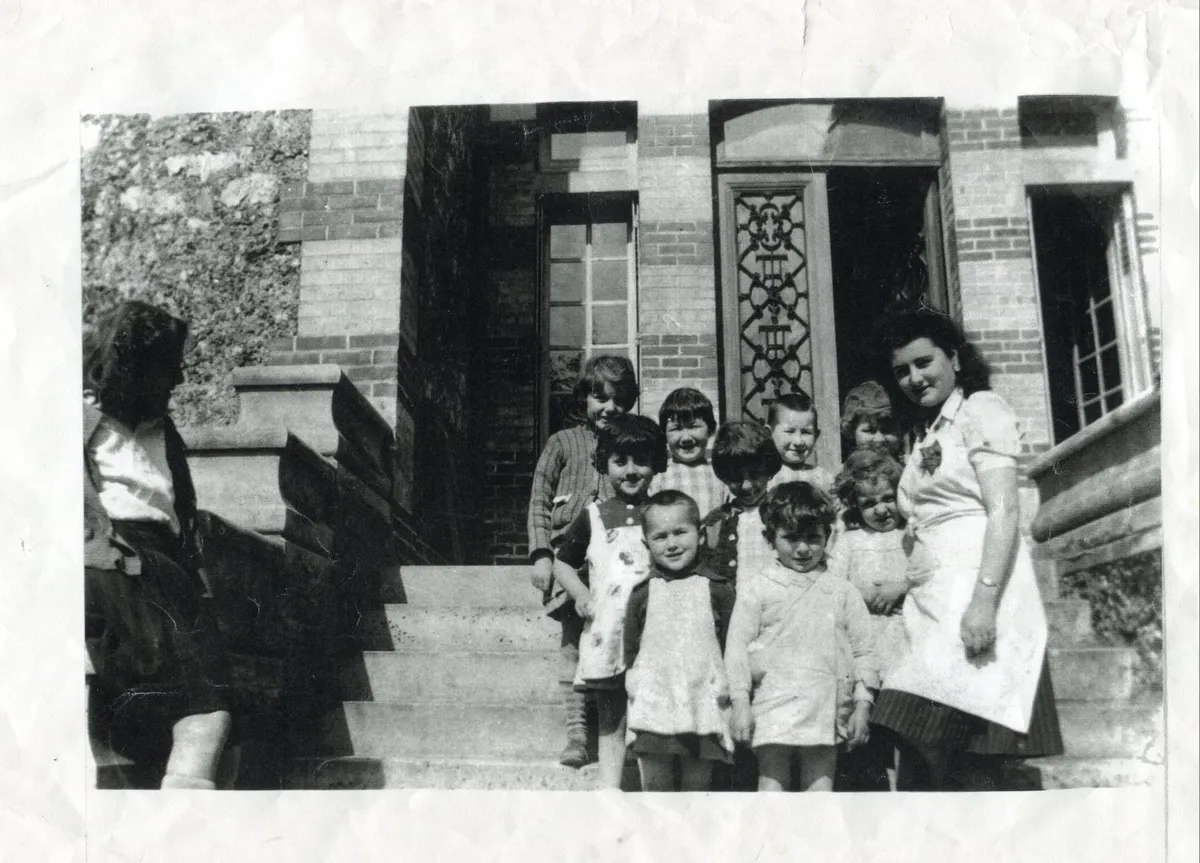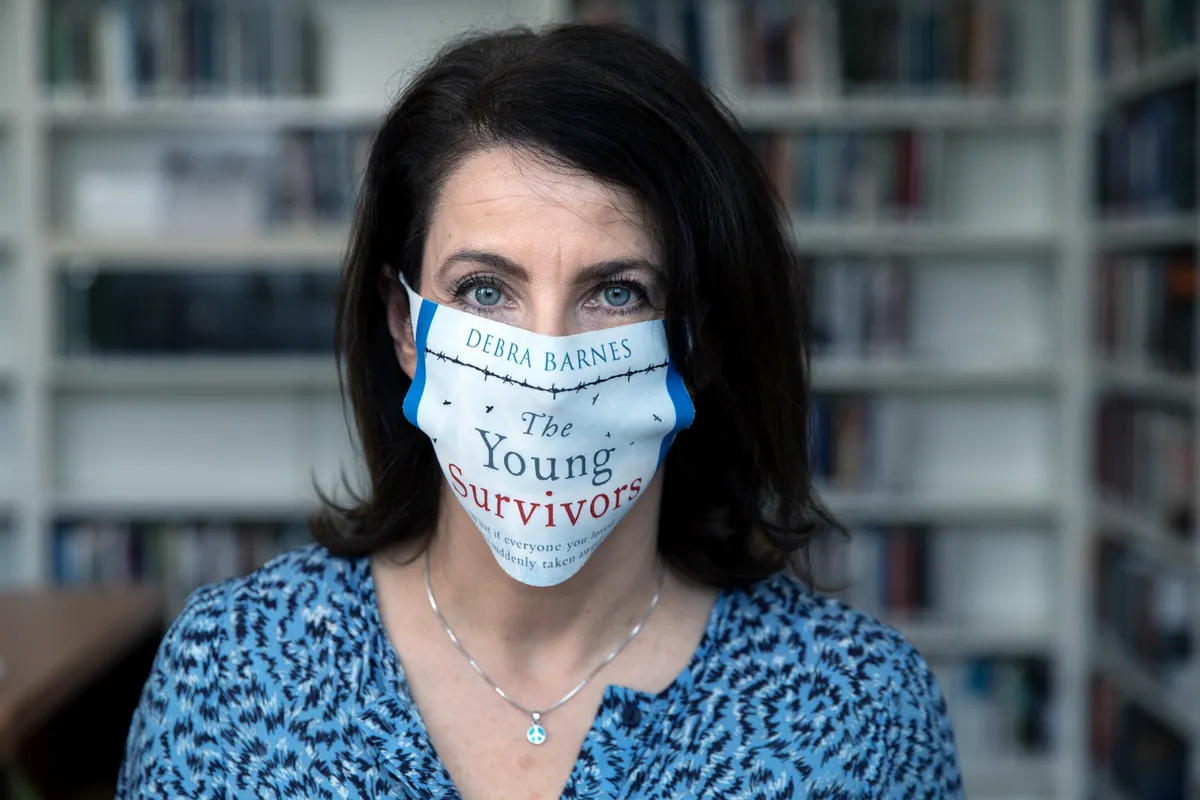“Every time I looked in the mirror I saw her, and when I spoke I heard her voice. When I hurt myself and cried I felt her pain, and when I laughed with joy I shared her happiness.”
Paulette Szklarz was only six years old when she was separated from her twin Annette, who was arrested by the Nazis and taken to Auschwitz. The pain of losing her must have been unbearable.
Paulette survived the war and came to live in Britain where she was adopted by her older cousins. She married Maurice Barnes and they settled in Edgware, Middlesex, where they raised their daughters Caron and Debra.

From fact to fiction
Paulette and her family’s wartime experiences have inspired Debra so much that she has written a novel based on their lives. The Young Survivors is a tribute to all of the victims of the Holocaust.
“I had a strong sense of Jewish identity while I was growing up,” Debra explains. “We had special Friday night dinners, and attended synagogue on High Holidays. It was a very happy childhood, but there was always something in the background.”
Debra knew that her mum Paulette had been born in France, and that she lost her twin sister during the Holocaust. “We had one black-and-white photograph of Mum’s family in the lounge. It showed my grandmother Cecile Szklarz; my uncles Jacques, Jean and Nathan; and my grandfather Traitel holding Paulette and Annette as babies.
“We never spoke about the Holocaust when I was a child, because we knew that it would upset Mum. We didn’t read books or watch films about it either. In adulthood I became more curious about Mum’s experience and what had happened to the Szklarz family. It was a challenging subject to raise, however.
We never spoke about the Holocaust when I was a child, because we knew that it would upset Mum.
“Mum was born in 1938, so her memories of wartime were sketchy. She remembered living in an orphanage in Paris, and being sent to a convent where they took Holy Communion. She liked it because she was given something to eat and drink.”
Paulette’s older brothers Jacques and Jean survived the war, and emigrated to the USA. They could recall their French childhood in vivid detail. “Uncle Jean visited us, and I interviewed him on camera. Before Uncle Jacques died in 1999 he gave a testimony to the Shoah Foundation, which provided crucial detail.
“I decided to write a novel about the war seen through the eyes of the children. They were there. Who better to tell the world of the Nazi atrocities?” Debra has changed the names and added fictional depth to the relationships, but the novel contains appalling truths.
Debra’s grandparents Traitel and Cecile Szklarz were born in Poland, and moved to France to escape the pogroms. The family had happy times living in the border city of Metz, although the boys suffered some antisemitic bullying from other children.
After the Second World War broke out, the whole family was moved away from Metz because of its proximity to the German border. They were allocated a farmhouse near Poitiers, with their grandmother Zysla, an aunt and uncle, and four cousins.
Short-lived sanctuary
Initially, the children enjoyed rural life despite the growing Nazi threat. In 1940, laws were passed that robbed Jewish people of their human rights. Curfews were introduced, the celebration of religious festivals was banned and Jews were forced to wear the yellow Star of David. Rumours of violence and arrests terrified the close-knit Jewish community.
One night in August 1942 the Gestapo, aided by the French police, raided the farmhouse and Traitel was arrested. The children never saw him again. This marked the beginning of several terrifying nocturnal raids that culminated in the arrest of Cecile, Paulette and Annette. At the age of 17, Jacques was left in sole charge of his two young brothers, Jean and Nathan.
In an astonishing act of bravery, Jacques went to the Gestapo headquarters in Poitiers the following day and argued that at four years old his sisters were too young to be imprisoned. An officer humoured him, and give him a note for their release. Jacques went to the camp, collected his sisters, and saw his mother for the final time.
In an astonishing act of bravery, Jacques went to the Gestapo headquarters in Poitiers.
Reluctantly, he agreed for the twins and Nathan to be placed in orphanages in Paris. They were sent away in 1943 by the Union Générale des Israélites de France (UGIF) and lived in an orphanage near Sacré-Cœur, followed by another in Louveciennes.
Jean attended a trade school until he, too, was in danger of being arrested. He was given refuge with the Scout Movement and later a new identity in a Catholic school. Jacques worked on a farm in Vichy France and joined the French Resistance in 1944. The boys’ fight for survival and close shaves are both enthralling and humbling to read.
By 1944, the Szklarz family had been splintered for two years, so Jacques and Jean knew little about what happened to their younger siblings in the orphanage. There was a gap in the family history at this point.
However a chance discovery online led to heart-rending revelations and an emotional reunion for Paulette. “One of my American cousins researched ‘Louveciennes’, and the name of a book appeared,” says Debra. “It was called Je ne vous oublierai jamais, mes enfants d’Auschwitz, or in English I Will Never Forget You, My Children of Auschwitz.
“The book was written by Denise Holstein, who was a monitor in the orphanage and helped to care for Paulette, Annette and Nathan. Mum remembered Denise, even though she was only very young at the time.”
The cover of the book, which was published in 1995, has a picture of Denise with a group of children, including the twins. “It was incredible to show this to Mum, who had never seen a photo of herself at that age.”

Orphanage memories
Paulette contacted Denise, who thought that she must have died during the war and was thrilled to learn that she was still alive. They arranged to meet at her home in the south of France.
“Mum was nervous about the reunion, but Denise was so lovely that she found it a positive experience. Denise told her that, although there was little food in the orphanages, the children were happy there and knew nothing of the horrors taking place outside. It was such a relief to hear that.
“Mum knew that she became very ill with measles in July 1944, and was hospitalised in Saint-Germain.” Denise’s book revealed the terrible events that followed.
On 22 July 1944, the Gestapo arrived at the orphanage and arrested all 34 Jewish children. Denise, Annette, Nathan and their friends were labelled “future terrorists” and sent to Drancy internment camp in Paris.
The Gestapo hurried to the hospital to arrest Paulette, but someone from the orphanage must have tipped off the nurses because they hid her just in time. She was sent to a convent and given a new identity as a Catholic.
The nuns saved Paulette’s life by shielding her until France was liberated. She remained in the convent for a year until she was reunited with Jacques and Jean via an agency that helped displaced families.

Journey to Auschwitz
Denise was taken to Auschwitz with Annette, Nathan and the other children on Convoy 77, the last large deportation from Drancy. The Allies liberated Paris just three weeks later.
Denise appears in Debra’s novel as the character ‘Jacqueline’, and she gives a first-hand account of the horrific three-day journey to Auschwitz and their arrival in ‘Hell’. Denise was older than the other children, and survived because she was selected for work. Tragically, Annette, Nathan and the orphans of Louveciennes were taken to another unimaginable fate.
“Mum must have carried a terrible burden of guilt, being a surviving twin. She also had to endure the loss of her parents and Nathan. She managed incredibly well, but it was all held inside.”
Since 2017, Debra has worked for the Association of Jewish Refugees, helping Holocaust survivors to write their life stories. “The people I work with came to Britain as young refugees or on the Kindertransport, and are very elderly now. It’s vital that we keep their treasured memories alive, and continue to educate people about the Holocaust.”
It’s vital that we keep their treasured memories alive, and continue to educate people about the Holocaust.
Debra’s book is a loving and powerful tribute to Traitel, Cecile, Nathan and Annette. She has given them back their humanity.
“It was very rewarding to write, although difficult as you can imagine,” Debra reveals. “Mum passed away in 2010, and I regret that she can’t read the book. It’s dedicated to the 76,000 French Jews who perished during the war and to Mum, who was an incredible survivor.”
Have you got a family history story to share with Who Do You Think You Are? Magazine? Contact us today!